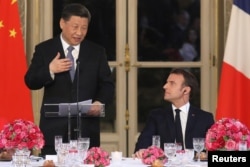Chinese President Xi Jinping is continuing his visit to Europe with the second day of a state visit to France.
On Tuesday, French President Emanuel Macron invited German Chancellor Angela Merkel and European Commission President Jean-Claude Junker to discuss world trade with Xi. They met in Paris at France’s presidential palace.
The EU is China’s biggest trade partner.
During his European trip, Xi has stressed the importance of what he calls win-win economic cooperation with European countries.
On Monday, Chinese and French officials signed business contracts worth an estimated $40 billion. That included a deal to buy 300 Airbus passenger jets. Airbus is Europe’s major aerospace company. The deal, valued at $34 billion, equals China’s 2017 order for 300 passenger planes from the American company Boeing.
Xi called on France and China to deepen cooperation in nuclear energy, aerospace and other traditional industries.
Macron said that France is willing to cooperate with China on its Belt and Road Initiative, known as the BRI, for financing development. The BRI provides financing for bridges, railways, roads, ports and other infrastructure linking China with the rest of the world.
On Tuesday, Macron, Xi and Merkel said they want to make reforms to the world trade system, which has increasingly been marked by trade disputes. Both the United States and Europe have criticized China for enjoying relatively free trade with its World Trade Organization partners while placing barriers to foreign investment at home.
Xi expressed a willingness to continue long-promised economic reforms sought by Western countries.
“We will continue to stay on the path of reform…” the Chinese president said in Paris.
Macron and the other European leaders stressed cooperation and the need to give all sides something through trade and compromise, often called multilateralism.
Their meeting took place as the United States continues difficult negotiations with China over trade. The U.S. and its EU allies want China to reduce barriers and protect intellectual property rights.
The U.S. has angered its European trading partners and China by placing import taxes on products like steel and aluminum and threatening other measures.
In a joint statement, Xi and Macron called on each other to work together to support a rules-based international order. Germany’s Merkel noted the importance of having all sides involved. “There can’t be multilateralism without the United States,” she noted.
On Saturday, China expanded ties with one of Europe’s largest economies, Italy. Officials of the two countries signed an agreement that made Italy the first major European country to join the BRI. The document was agreed to during Xi’s visit to Rome while meeting with Italian Prime Minister Giuseppe Conte.
I’m Mario Ritter Jr.
Mario Ritter Jr. wrote this story for VOA Learning English from AP, Reuters and AFP reports. Ashley Thompson was the editor.
_____________________________________________________________
Words in This Story
intellectual property –n. something such as an idea, invention or process that comes from a person’s mind
infrastructure – n. the system of public works, such as roads, railways and ports in an area
We want to hear from you. Write to us in the Comments section, and visit our Facebook page.






